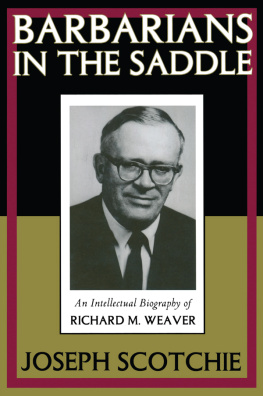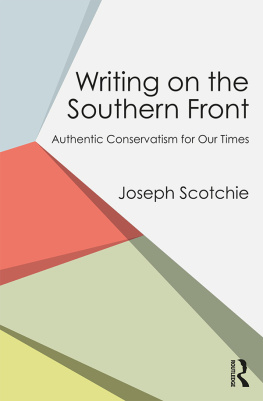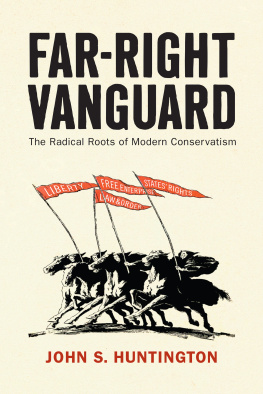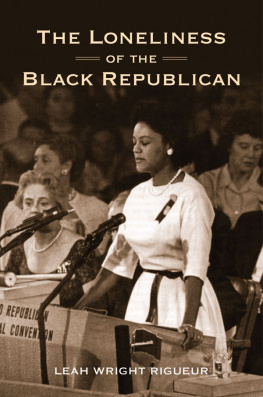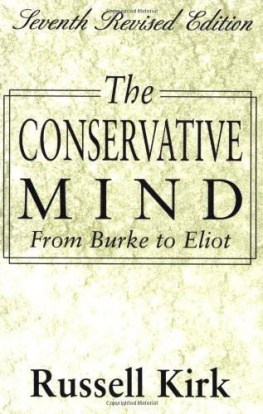Revolt from the Heartland
First published 2002 by Transaction Publishers
Published 2017 by Routledge
2 Park Square, Milton Park, Abingdon, Oxon OX14 4RN
711 Third Avenue, New York, NY 10017
Routledge is an imprint of the Taylor and Francis Group, an informa business
Copyright 2002 by Taylor & Francis.
All rights reserved. No part of this book may be reprinted or reproduced or utilised in any from or by any electronic, mechanical, or other means, now known or hereafter invented, including photocopying and recording, or in any information storage or reterieval system, without permission in writing from the publishers.
Notice:
Product or corporate names may be trademarks or registered trademarks, and are used only for identification and explanation without intent to infringe.
Library of Congress Catalog Number: 2002075516
Library of Congress Cataloging-in-Publication Data
Scotchie, Joseph, 1956-
Revolt from the heartland : the struggle for an authentic conservatism / Joseph Scotchie.
p. cm.
Includes bibliographical references (p.) and index.
ISBN 0-7658-0128-0 (alk. paper)
1. united StatesPolitics and government1989- 2. United StatesPolitices and governmentPhilosophy. 3. ConservatismUnited States. 4. Right and left (Political science) 5. PopulismUnited States. 6. GlobalizationPolitical aspectsUnited States. 7. Anti-imperialist movementsUnited States. I. Title.
E839.5.S38 2002
320.520973dc21 2002075516
ISBN 13: 978-0-7658-0128-9 (hbk)
Referring to Pat Buchanans call to save the old Republic with an America First foreign and domestic agenda, Bill Kauffman joked that [while] this salvage job may make raising The Titanic seem like plucking a toy boat from a bathtub, what patriot cannot heed the call?
This underfunded, mostly unknown movement (referred to in this volume as both paleoconservative and Old Right) provided the intellectual firepower behind the troubled populism of the 1990s. In that decade, the Old Right and its grass-roots allies made plenty of noise: the renegade candidacies of Buchanan and Ross Perot, a spirited opposition to global free trade deals and various American wars around the world, support for initiatives in California opposing illegal immigration and affirmative action, plus support also for term limits. These are just some of the issues where such populists took on a well-funded left-right establishment. The revolt against globalism has, at the least, roiled American presidential politics. Perots candidacies took huge chunks out of the Republican Partys old Nixon-Reagan coalition, making life especially miserable for George Bushs 1992 re-election bid. In 2000, Ralph Naders left-leaning populism did not do as well as Perots previous campaigns, but his vote total was enough to deny A1 Gore the presidency.
In all, its been too much noise for the conservative establishment to take. Conservatives claim opposition to ethnic cleansing in Yugoslavia, but at home, they have taken part in some ideological cleansing of their own. Nearly all of the living writers mentioned in this volume have seen their careers targeted simply for taking contrary positions on a globalist agenda where both the Beltway Right and the Clinton administration found common agreement. Joe Sobrans antiwar stance during the Persian Gulf War eventually led to his firing from his senior editor position at National Review. A few years earlier, that publications senior book editor, Chilton Williamson, Jr., left NR after failing to convince his colleagues to agree with his own restrictionist views on immigration. On it went. In 1995, Samuel Francis was fired from the Washington Times after nine years of service to that publicationthis despite the fact that Francis had won the only two Distinguished Writing Awards of the American Society of Newspaper Editors in the Times brief history. Paul Gottfried lost a teaching position at American University in Washington after a cabal of East Coast conservatives voiced their objection to such a hiring. Pat Buchanan retained both his nationally syndicated column and his chair on the popular cable talk show, Crossfire, but his presidential campaigns were sent reeling by a string of unprecedented smear campaigns, orchestrated by all elements of the American media.
The lack of access to the mass media is not all that hampers the Old Right. It also has suffered from a lack of funds, namely in the form of grants from the rights famed four sisters (Olin, Bradley, Scaife, and Smith-Richardson foundations). While the Rockford Institute, the nerve center of paleoconservative thought, has a budget of a little over $1 million, the Heritage Foundation and the American Enterprise Institute, both located in Washington, have budgets of over $35 million per annum.
Still, the new Old Right has articulated an arresting worldview, presented by an array of learned and provocative writers: Francis, Sobran, Buchanan, Gottfried, Williamson, plus Thomas Fleming, Clyde Wilson, Lew Rockwell, and Bill Kauffman, among others. This volume examines the intellectual forerunners to todays Old Right: the anti-Federalists who opposed ratification of the U.S. Constitution; opponents of empire who stood against the Spanish-American War, Woodrow Wilsons League of Nations, and Franklin Roosevelts New Deal; plus those, past and present, who have cast a cold eye on the legacy of the War Between the States. The importance of the classics, the benefits of republican living, a recognition of regional cultures, the primacy of the family over the state, a moral case against immigration, a practical case against an interventionist foreign policy, and in general, a Tenth Amendment approach to issues ranging from education to such recurring ones as school prayer and abortion are other characteristics that distinguish the Old Right. Paleoconservatives have something to say, but whether people care to listen is another subject they do not shy away from addressing, either.
Our enemies realize that to control the past is to enjoin the future. So claimed M.E. Bradford in 1986, during a time of Old Right discontent with the administration of Ronald Reagan. When Bradford spoke of our enemies, he meant not only the left, but also elements of American conservatism then at loggerheads with the Old Right. Liberals are smart enough to know that the culture wars represent the most important political battles. Paleoconservatives share that sentiment, too. Throughout the twentieth century, American conservative intellectuals have long considered themselves an embattled minority, out of step with an ever-daunting age of enormity. The result has been an intense study not only of Americas wrong turns, but Western civilizations as well.
Richard Weaver, for instance, lamented the collapse of the High Middle Ages, the era of knighthood and chivalry. Followers of Edmund Burke, especially Russell Kirk, point to the French Revolution and the rise of egalitarianism under the bloodied slogan of liberty, equality, fraternity as paving the way for twentieth-century-style tyranny. Eric Voeglin, the famed emigr political scientist, singled out the gnosticism of the first and second centuries, where the first major revolt against Christian dogma took place. What such theses have in common is the leveling of a responsible hierarchy in favor of a revolution characterized by state planning and social engineering. Man may think he is his own priest and ethics professor, when in fact, he is a willing ward of the state. Furthermore, most of these calamities point to the fall of a non-materialistic, generally religious society.


